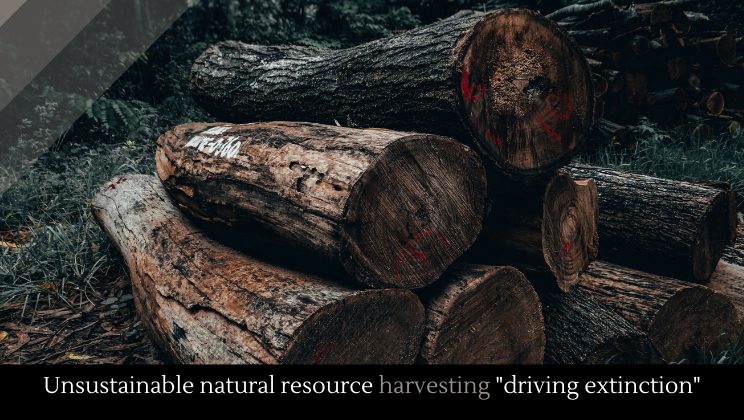Unsustainable natural resource harvesting “driving extinction”
Posted by Annie May / July 9, 2022
According to a landmark study, 1 in 5 people rely on logging, fishing, and hunting for their daily needs, but their practices may not be sustainable, “driving extinction” levels ever higher.
California is banning single-use plastics. India and Canada are also set to ban single-use plastics in order to combat environmental pollution and climate change.
The base camp at Mt. Everest is going to be moved, as a result of melting glacier ice. Yellowstone is suffering a massive flooding event which, statistically, may only happen once every 500 years.
The Feds told states that they need to dramatically ramp up conservation of the Colorado River system, or else the government will step in.
The federal government announced that it will delay releasing water from one of the Colorado River’s largest reservoirs as a result of the historic drought in the west.
India and Pakistan are currently suffering a devastating heat waves, causing water and electricity shortages.
Sea levels in New Zealand are rising twice as fast as previously thought, according to new data. Meanwhile, in this hemisphere, new government maps of the United States west reveal that nearly the entire United States west is already in draught, before summer has even started.
Last month, the Antarctic is currently experiencing temperatures 70 degrees above normal. And, this past year, the Western United States and Mexico experienced the worst drought in 1,200 years. Meanwhile, a report by the New Climate Institute accuses top companies like Facebook, Apple, and Google are not changing quickly enough to slow climate change, and what’s worse they’re exaggerating their progress.
All of the snow at the Beijing Olympics is human made, a bad sign for both the climate and future winter Olympics. The Great Salt Lake is disappearing, which could lead to a major ecological disaster. New research suggests that the extreme heat in the oceans passed the point of no return in 2014, meaning warmer oceans are now the new norm.
Last year, climate change-related disasters cost the world some $100 billion. Record temperatures topping 67º F hit Alaska this month, setting a record for December. The weather has led to torrential rain, and raises the possibility of major flooding as the climate continues to warm.
According to the annual Global Carbon Budget Report, the planet has eleven years to avoid dire climate scenarios.
The largest delegation at the COP26 climate conference is affiliated with the fossil fuel industry. Perhaps this is why Greta Thunberg has called the COP26 climate conference a failure. “It is not a secret that COP26 is a failure. It should be obvious that we cannot solve a crisis with the same methods that got us into it in the first place,” she said. As if to make her point, Japan has refused to sign the statement on ending the use of coal-powered plants.
The CEO of Exxon has been accused of lying to Congress about his company’s knowledge of its contribution to climate change––and its attempts to cover that all up.
A major document leak has revealed that wealthy nations like Saudi Arabia, Japan, and Australia (among others) are pressuring the UN to slow their shift away from climate change. Wealthy nations are also questioning why they should pay poor countries to shift towards green technologies.
A metastudy of of nearly 90,000 climate studies reveal that 99.9% of studies agree that humans caused climate change, effectively quashing the argument that there’s any kind of debate.
More news.
Comments are off for this post.